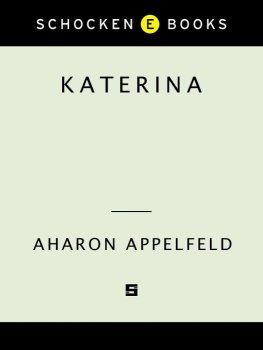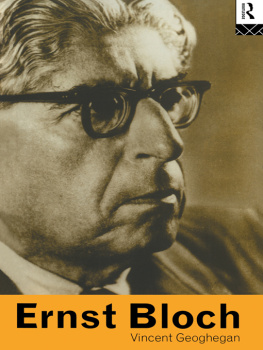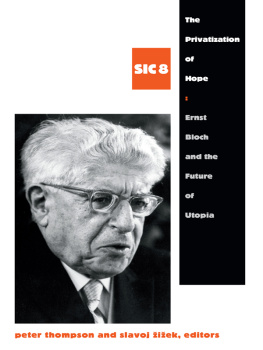ALSO BY AHARON APPELFELD
Badenheim 1939
The Age of Wonders
Tzili
The Retreat
To the Land of the Cattails
The Immortal Bartfuss
For Every Sin
The Healer
Katerina
Unto the Soul
Beyond Despair: Three Lectures and a Conversation with Philip Roth
The Iron Tracks
The Conversion
The Story of a Life
A Table for One
All Whom I Have Loved
Laish
Blooms of Darkness
Until the Dawns Light
This is a work of fiction. Names, characters, places, and incidents either are the product of the authors imagination or are used fictitiously. Any resemblance to actual persons, living or dead, events, or locales is entirely coincidental.
Translation copyright 2014 by Schocken Books, a division of Random House LLC
All rights reserved. Published in the United States by Schocken Books, a division of Random House LLC, New York, and in Canada by Random House of Canada Limited, Toronto, Penguin Random House companies. Originally published in Israel as Pitom Ahavah by Keter Publishing House Ltd., Jerusalem, in 2003. Copyright 2003 by Aharon Appelfeld and Keter Publishing House Ltd.
Schocken Books and colophon are registered trademarks of Random House LLC.
Library of Congress Cataloging-in-Publication Data
Appelfeld, Aron, author.
[Pitom ahavah. English]
Suddenly, love : a novel / Aharon Appelfeld;
translated from Hebrew by Jeffrey M. Green.
pages cm.
ISBN 978-0-8052-4295-9 (hardcover). ISBN 978-0-8052-4315-4 (eBook)
I . Green, Yaacov Jeffrey, translator. II . Title.
PJ 5054 .A 755 P 5813 2014 892.436dc23 2013039268
www.schocken.com
Jacket photograph Franoise Lacroix/panoptika.net
Jacket design by Linda Huang
v3.1
Contents
1
ERNST TURNED SEVENTY, AND FOR HIS BIRTHDAY IRENA baked a cheesecake and decorated it with strawberries.
Happy birthday, she says and places the cake on the table.
At my age, one no longer celebrates, says Ernst without looking at her.
Thats not true, Irena replies, frightened by the words as they emerge from her mouth.
Irena has been working in Ernsts house for two years, since his operation. She arrives every day at eight and leaves at three. Some days she stays longer. They speak little, but sometimes Ernst surprises Irena with a question, or an idea that is preoccupying him.
Why did you think of baking a cake for me? he asks without raising his eyes.
I thought it would make you happy. She answers in a full sentence.
Me?
Cheesecake always makes people happy, Irena says and is pleased with her reply.
I enjoy a good cake, Ernst says, but it doesnt make me happy.
Irena doesnt understand the difference and doesnt answer.
At my age happiness is tiring, he adds.
A year earlier Ernst was still reserved with Irena, but her diligence and devotion won his heart. Now he leans forward to listen when she offers advice about the house or tells him about something she found interesting. But Irena speaks little. The few words that leave her mouth during the day are measured. She knows that Ernst doesnt like to chat or tell jokes. He is pleased when she takes a hint or guesses instead of asking him straight out. Ernst constantly surprises Irena. Yesterday he told her, I wouldnt have wanted to live a different life. For a moment she was perplexed. His life hasnt been a bed of roses.
Irena sits in a corner without looking at Ernst. She likes to serve him food and wait for his reaction, but she is careful not to disturb his thoughts. Sometimes he sinks so much into himself that he forgets to eat. Ernst speaks to Irena in German, now and then with a Yiddish word and sometimes also a sentence in Hebrew. He says that his memory has weakened since the operation. Irena doesnt notice that. The words that come from his mouth are clear, and she understands his requests without any explanation. She has noticed: Ernst seldom describes things, but sometimes he says something so fresh that its like a pear that was just peeled and placed on a plate. He also has little customs that she likes: putting on a hat before leaving the house, bowing when she hands him his walking stick.
I never imagined Id reach the age of seventy, Ernst says, as though to himself.
Thank God, Irena cries out.
Ernst doesnt like this display of religiosity, but he makes no comment.
Seventy is a fine age, she adds.
Its no different from any other age: youre just weaker, and your memory betrays you more frequently.
Irena doesnt agree with him. Ernst is alert. He reads and writes. When he goes for a walk, his posture is erect and his bearing stands out.
You say that seventy is a fine age.
Am I mistaken? She responds immediately.
Of course youre mistaken.
By now Irena knows that the word mistaken doesnt always indicate disagreement. Sometimes it implies unspoken agreement with slight provocation.
The day is nearly over. Irena has tidied the kitchen and set the table for supper. She puts on her coat and wishes Ernst a good night.
The way home is not long. Irena lives in the Old Katamon neighborhood of Jerusalem, a twenty-minute walk from Ernsts house. Not long ago, her life had been scattered, her days vexed and pointless. She used to stand in the street and wonder whether to take a long walk or return home. Now she walks slowly, a bit tired, but full of words and the sounds of words that she had absorbed during the day.
Irenas apartment has three rooms, and a kitchen and a balcony. Here she grew up, and here her parents died. After their death she preserved their memory with little ceremonies she invented. Since she started working for Ernst, Irena has done less of that, but she still goes to the cemetery on their birthdays and on the anniversaries of their deaths. On the Sabbath and holidays she arranges the house exactly the way her mother did. But most of her thoughts are now devoted to Ernst. Sometimes, when her fears get the better of her, she goes back to visit him in the evening. She serves him a cup of tea or peels an apple for him. Since she started working for Ernst, Irena has stopped going downtown, and she doesnt even go out for short strolls.
2
YOU WERE BORN IN ISRAEL, ISNT THAT RIGHT? ERNST surprises her again the next day.
No. I was born in a displaced persons camp near Frankfurt.
I was sure, for some reason, you were born in Israel.
I dont remember anything about it, Irena says, and immediately regrets it. Her parents had nurtured the memory of that camp to the point where sometimes it seemed to her that she remembered the smallest details. Her parents had met there. Her mother had become pregnant and only in the sixth month of her pregnancy had they been married, by an American army rabbi. Her mother had told her this at the end of her life. In any event, that DP camp near Frankfurt had been impressed in Irenas memory, and sometimes she dreamed about it. Sorry, I do remember. She is about to take back her words, but she immediately sees that this would be foolish.
Ernst is in a good mood this morning. He reads the newspaper and jokes about a political hack who is pretending to be an honest man. Just like before the war. They say that life doesnt repeat itself. Thats a mistake. It does repeat itself. Ernst reads newspapers and is well informed about events in the country. Five years earlier he divorced Sylvia, his second wife, and quit his job. About Sylvia, who immigrated to Vienna, he speaks little, just a scornful remark here and there.
Next page














